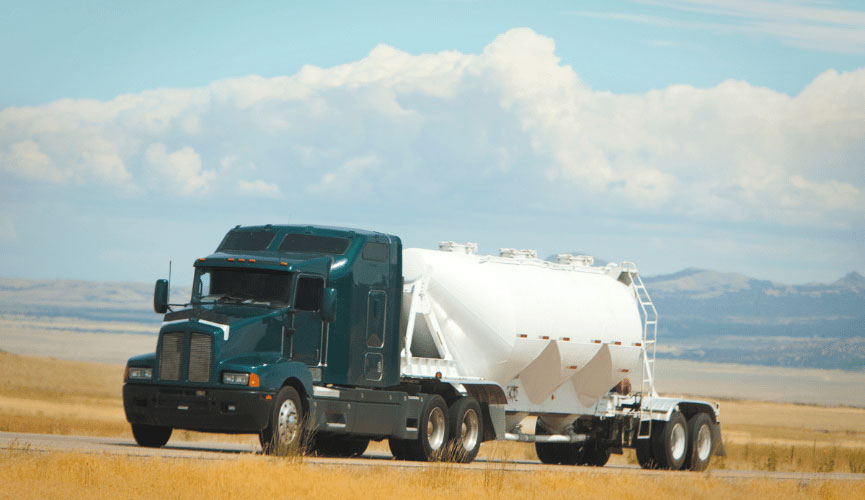Dry bulk trucking is a vital transportation segment specializing in large quantities of moving dry, unpackaged goods. These goods are typically poured, scooped, or augured into the truck’s trailer rather than loaded individually like conventional cargo. Dry bulk trucking is crucial in various industries, from agriculture to construction, providing an efficient and cost-effective transport of bulk materials.
What is Dry Bulk Trucking?
Dry bulk trucking involves transporting dry, granular, or powdered materials that are non-liquid and non-perishable. These materials are loaded directly into the truck’s trailer, often designed with specific features to facilitate bulk cargo’s efficient loading and unloading. Dry bulk materials vary widely and can include:
- Agricultural Products: This category includes grains, seeds, animal feed, and fertilizers. Dry bulk carriers are critical in moving products from areas to processing facilities and distribution centers.
- Construction Materials: Dry bulk trucking is essential for transporting construction materials like cement, sand, gravel, and gypsum to construction sites. These materials are crucial for various building projects.
- Chemical Powders: Certain chemicals, such as lime, calcium carbonate, and polymers, are often transported in dry bulk form. They are used in industries like manufacturing and wastewater treatment.
- Food Products: Dry bulk carriers transport ingredients like sugar, flour, and powdered milk to processing plants. These materials are essential for the production of various food products.

Dry Bulk Trucking Process
The process involves several key steps to ensure the efficient and safe transport of loose materials:
- Loading: The process begins with the loading of dry bulk materials at the source, typically a manufacturing facility, mine, or storage silo. Specialized equipment, such as conveyor belts or pneumatic systems, loads the materials into the truck’s cargo hold.
- Securing the Load: The dry bulk materials must be securely fastened to prevent shifting during transport. This is vital for maintaining stability and safety on the road.
- Transport: The loaded dry bulk truck then starts its journey to the destination. The driver must follow specific routes and adhere to transportation regulations to ensure safety.
- Unloading: Upon arrival at the destination, the dry bulk truck is prepared for unloading. The unloading process varies depending on the type of material and the equipment used. Standard methods include gravity discharge, pneumatic discharge, or tilting the truck’s cargo hold.
- Cleaning: After unloading, the truck’s cargo hold is thoroughly cleaned to remove any remaining material and prepare it for the next load. Thorough cleaning is vital to prevent contamination and maintain the quality of future shipments.
- Maintenance: Regular maintenance of the truck and the specialized equipment used for loading and unloading is crucial. This helps prevent breakdowns and ensures the safe and efficient operation of the vehicles.
- Documentation: Throughout the entire process, accurate documentation is essential. This includes records of loading and unloading, safety inspections, and compliance with regulations. Proper documentation helps track the movement of materials and ensures regulatory compliance.
- Safety: Safety is paramount in dry bulk trucking. Drivers receive training to handle various materials safely and must adhere to strict safety protocols during all phases of transportation, from loading to unloading.
- Environmental Considerations: Trucking companies focuses on ecological sustainability. They may employ strategies to minimize emissions, reduce waste, and promote responsible handling of materials.
Advantages of Dry Bulk Trucking
- Efficiency: Dry bulk trucking is efficient for quickly transporting large materials. It reduces loading and unloading times compared to handling each item individually.
- Cost-Effective: Bulk transportation is cost-effective for both carriers and customers. It minimizes packaging and handling costs.
- Reduced Environmental Impact: Bulk transport often involves fewer trips than traditional methods, leading to reduced fuel consumption and emissions.

Challenges of Dry Bulk Trucking
Dry bulk trucks are specialized vehicles that transport these materials efficiently and safely. Dry bulk trucking presents several challenges that drivers and companies in this industry must address. Here are explanations of each challenge:
1. Danger of Contamination
Dry bulk materials are often sensitive to contamination. Even small traces of a previous cargo can render an entire shipment unusable or unsafe. Preventing contamination requires rigorous cleaning procedures between hauls and strict adherence to loading and unloading protocols.
2. Fewer Dry Bulk Hauling Containers
Dry bulk materials are typically transported in specialized containers such as hopper trailers for solids or pneumatic tankers for powders. These specialized containers are expensive and less common than standard freight trailers. As a result, securing the right equipment for specific materials can be challenging, and trucking companies may need to invest in a diverse fleet to meet various customer needs.
3. Requirements of the Driver
Transporting dry bulk materials often demands specialized training and knowledge. Dry bulk drivers must be familiar with the unique handling characteristics of different materials and safety procedures for loading, unloading, and preventing contamination. They must also understand the specific equipment used for other materials and know how to operate it safely.
4. Type of Equipment Needed
The type of equipment needed for dry bulk transport depends on the material being hauled. Solids, powders, liquids, and gases all require different types of containers and loading/unloading equipment. Acquiring and maintaining this specialized equipment can be costly, and trucking companies must invest in the right resources to handle a variety of materials.
Dry bulk trucking is a crucial logistics component, ensuring the efficient movement of essential materials across various industries. From agricultural products to construction materials, dry bulk carriers are vital in keeping supply chains running smoothly. While it offers efficiency and cost savings, it also comes with unique challenges that carriers and shippers must address to maintain safety and environmental standards.
Dry Bulk Trucking FAQs
Safety is a top priority in dry bulk trucking. Trained drivers handle the specific materials they transport safely. They must follow regulations for securing loads, maintaining vehicle integrity, and complying with transportation laws. Additionally, safety equipment like dust control systems, proper ventilation, and safety gear for handling hazardous materials is used when necessary. Regular maintenance of vehicles and equipment is also standard practice to ensure safety on the road.
Weight restrictions apply to dry bulk trucks like any other commercial vehicle. The specific weight limits can vary by region and road type. Generally, these limits consider factors like the number of axles and the type of cargo being transported.
Dispatchers play a crucial role in dry bulk trucking. They are responsible for coordinating load assignments, ensuring that drivers have the necessary permits and clearances, and monitoring the progress of shipments. Dispatchers also handle communication between drivers, customers, and other stakeholders, helping to ensure a smooth and efficient transportation process.









